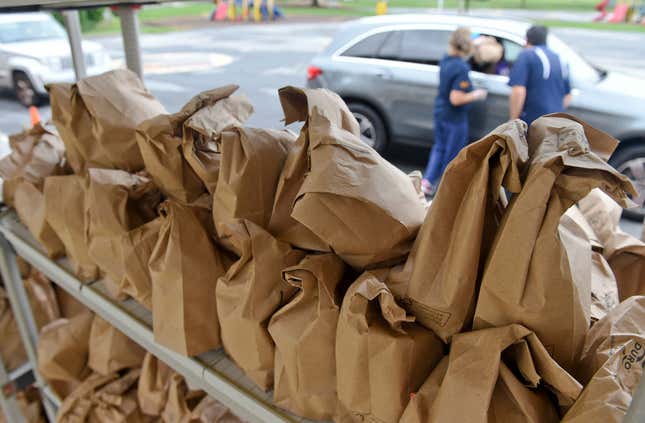
The expanded child tax credit reached 61 million children by the end of 2021 and cut child poverty by 30% ended in January. Since that expiration, Columbia University’s Center on Poverty and Social Policy reported almost four million children have fallen into some food insecurity. The child poverty rate rose from 12.1 percent to 17 percent between December 2021 and January 2022.
When kids around the country can’t get enough food to eat at home, they rely on school breakfast and lunches. In 2020, the National School Lunch Program (NSLP) averaged 22.6 million children each school day. The first Covid-19 aid package allowed the USDA to relax rules like paperwork for parents and nutritional standards to enable more students to receive meals–even if they were learning remotely. Although many extensions have been passed, the program is slated to end in June 2022.
As reported by Politico, Congress is at a standstill on a former measure to extend the program outside of waivers. President of the School Nutrition Association, Beth Wallace, stated: “more than 100,000 emails to Capitol Hill this week to push for an extension of the waivers.”
“We all want to put the pandemic behind us, but what school meal programs face is nowhere close to normal,” said Beth Wallace, president of SNA, a group that aligns with both Democrats and Republicans and has sent more than 100,000 emails to Capitol Hill this week to push for an extension of the waivers.
“Congress’ failure to act will undoubtedly cause students to go hungry and leave school meal programs in financial peril,” Wallace said.
Senate Agriculture Chair Debbie Stabenow (D-MI) laid the blame squarely at the Republicans’ feet.
“Across America, more than 90 percent of our schools are open and our children are back in the classroom,” Stabenow said, in a statement to POLITICO. “But unfortunately, Republicans in Congress want to let down our children and their parents. Instead of continuing the bipartisan tools and flexibilities to help safely provide meals to students during school and over the summer, which could easily be done in the omnibus, Republican leadership has said NO and decided that they prefer to let our kids go hungry. This is a disgrace!”
A Republican aide commented that President Biden’s proposal in the omnibus spending bill set for a vote in the house on Wednesday was only for temporary measures and stressed a “return to normal” approach for reopening.
“President Biden submitted a $22 billion Covid supplemental request for the [omnibus spending bill] with not a mention of USDA or nutrition,” the aide said. “So there was no proposal for anyone to block. These were designed as ‘temporary’ Covid measures.”
“Parents and Republicans are for reopening our schools,” the aide said. “Many of these waivers were designed to encourage schools to close and go virtual. This is not a message we should be sending to schools at this point, when almost everyone agrees we should be returning to normal.”
With inflation still rising and supply chains struggling, this is a crucial program to extend–especially with children of color. Forty percent of Black and Hispanic school-age children are food insecure. Springer Link did a study and found cities do not prioritize meal distribution programs in cities populated mainly by children of color. If we do not extend the child tax credit and the universal lunch program, we are immensely failing the youth in this country.

